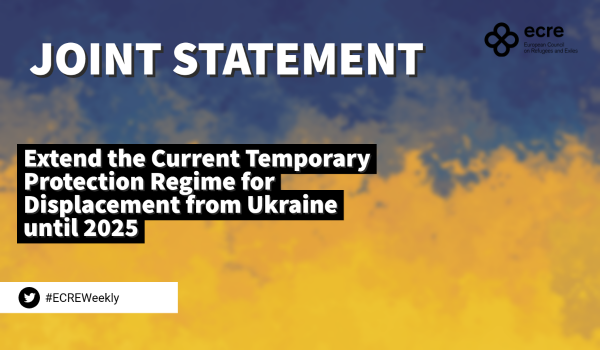Extending temporary protection is crucial for ensuring continuous access to rights for those displaced by the war in Ukraine and for maintaining a collective European response.
The activation of the Temporary Protection Directive (TPD) on 4 March 2022 stands as an unprecedented, prompt and efficient response to the displacement of millions of people fleeing the war in Ukraine. Triggered for an initial period of one year and then extended until 4 March 2024, the TPD provides a legal basis for the protection of almost 5 million people; countries which have not adopted the TPD have aligned national protection regimes with the temporary protection (TP) regime. In an immensely challenging context, the use of the TPD has been a success, ensuring immediate access to legal status and associated rights, and allowing collective management of the situation under the EU’s auspices, without the usual political conflicts and paralysis.
In light of the ongoing war and the related uncertainty experienced by current TP status holders, measures should be taken to extend their legal status to the full three years afforded by the TPD. The undersigned civil society organisations call on the European Commission to prepare a proposal for a Council Implementation Decision on the extension of the TPD until March 2025 as a matter of urgency.
A proposal could still be approved under the Swedish Presidency of the Council of the EU, given that the political agreement of the Member States is certain to be obtained now – but that may not be the case in the future. In the absence of an initiative from the European Commission, the Swedish Presidency or a group of Member States should make an informal or formal request for the extension to be tabled as soon as possible. As well as providing increased security for those displaced from Ukraine, an extension to the full three years allowed by the TPD will buy time for countries to put in place provisions for mediumterm support for those displaced by the war, be that voluntary return if circumstances allow or continued protection outside Ukraine if they do not. Extended use of the TPD will help avoid a situation where Member States under pressure resort to forcible return or other coercive and restrictive measures, or one where people feel obliged to exercise their right to apply for asylum, with the risk that asylum systems become overwhelmed. It will support access to inter-related rights and services, in particular:
- residence permits, which in most cases are tied to the validity of the currently active TP regime until March 2024 (or of even shorter duration). Issuing permits which will be valid for the duration of an extended TPD regime will ensure security and lessen the administrative burden for EU Member States;
- long-term housing, which represents one of the key needs among the TP holders, is not only restricted by the general shortage of available social housing but also affected by the preference given to long-term tenants in the private accommodation sector;
- employment and education, which require registration at a given address and the validity of residence documents;
- freedom of movement to and from Ukraine, afforded by the current TP regime and essential for maintaining family links and managing property and land, without fear of undermining the legal status in the EU and risking the suspension of the related benefits. In addition, prolonging TP status has the potential to reduce the vulnerability of TP holders to various forms of exploitation as well as the risk of a premature decision to return to Ukraine. At the same time, this measure will decrease undue stress and negative effects on the mental health of current TP holders, provoked by uncertainty about the duration of the protection regime. Finally, extending the validity period of the TPD now will allow the EU to maintain a response to the displacement which is collective and consistent across the EU Member States.
For further information:
- Joint statement in Ukrainian (including list of Signatories)
- Joint statement in English (including list of Signatories)

